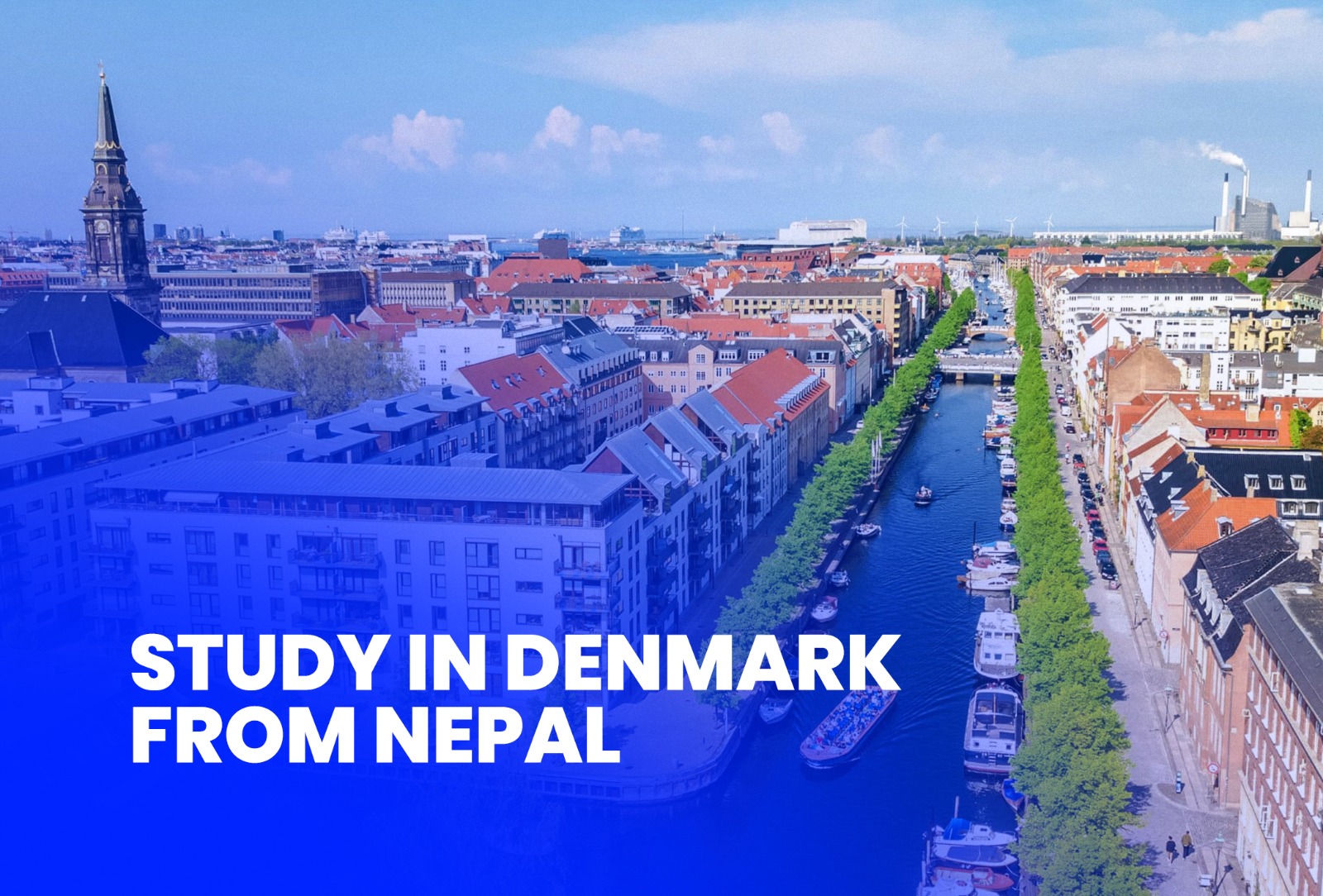.png)

Denmark has emerged as an excellent alternative to traditional study destinations like the US, UK, Australia, and Canada for Nepali students. This Nordic nation offers a perfect blend of educational excellence, quality of life, and post-study opportunities that make it increasingly attractive.
Table of Contents
Denmark operates on the European Bologna Process framework with a focus on student-centered learning. The education system emphasizes:
Over the past five years, the number of Nepali students studying in Denmark has grown by approximately 30% annually. This growth reflects increasing awareness about Denmark's educational quality and relatively lower costs compared to other Western destinations.
Denmark ranks consistently in the top 10 countries worldwide for education quality. Its universities maintain strong positions in global rankings:
Danish universities focus on developing critical thinking, innovation skills, and practical knowledge, qualities highly valued by global employers.
Denmark offers over 700 English-taught programs across various disciplines:
This diversity means Nepali students can find suitable programs regardless of their academic background.
Denmark consistently ranks among the world's safest countries with:
Cultural and Social Aspects
Danish society offers:
Denmark offers excellent post-graduation pathways:
Denmark offers various scholarship opportunities for Nepali students:
For Bachelor's Programs:
For Master's Programs:
For PhD Programs:
GPA requirements vary by institution and program:
Universities typically evaluate applications holistically, considering:
IELTS Requirements:
TOEFL Requirements:
Cambridge English Exams:
Danish Language:
There are several pathways to study without IELTS:
A complete application package includes:
Tips for Document Preparation:
Bachelor's Programs:
Master's Programs:
PhD Programs:
Program-Specific Fee Examples:
|
Expense |
Approximate Cost (DKK) |
NPR Equivalent |
|---|---|---|
|
Visa Application Fee |
2,115 |
40,000 |
|
Flight Ticket |
8,000-12,000 |
1.5-2.3 lakhs |
|
Initial Accommodation Deposit |
10,000-20,000 |
2-4 lakhs |
|
Insurance |
3,000-5,000 |
60,000-1 lakh |
|
Winter Clothing |
5,000-7,000 |
1-1.4 lakhs |
|
Initial Settlement Costs |
5,000-10,000 |
1-2 lakhs |
Copenhagen (Most Expensive):
|
Expense |
Monthly Cost (DKK) |
NPR Equivalent |
|---|---|---|
|
Accommodation |
4,000-7,000 |
80,000-1.4 lakhs |
|
Food |
1,800-2,500 |
36,000-50,000 |
|
Transportation |
400-600 |
8,000-12,000 |
|
Utilities |
800-1,200 |
16,000-24,000 |
|
Internet/Phone |
300-500 |
6,000-10,000 |
|
Study Materials |
300-500 |
6,000-10,000 |
|
Leisure |
800-1,500 |
16,000-30,000 |
|
Total |
~8,000-12,000 |
~1.6-2.4 lakhs |
Aarhus, Odense, Aalborg (More Affordable):
|
Expense |
Monthly Cost (DKK) |
NPR Equivalent |
|---|---|---|
|
Accommodation |
3,000-5,000 |
60,000-1 lakh |
|
Food |
1,500-2,000 |
30,000-40,000 |
|
Transportation |
300-500 |
6,000-10,000 |
|
Utilities |
700-1,000 |
14,000-20,000 |
|
Internet/Phone |
300-500 |
6,000-10,000 |
|
Study Materials |
300-500 |
6,000-10,000 |
|
Leisure |
700-1,200 |
14,000-24,000 |
|
Total |
~6,500-9,000 |
~1.3-1.8 lakhs |
Tips for finding affordable accommodation:
To obtain a Danish student residence permit, you must demonstrate that you have sufficient funds to support yourself during your stay. The Danish Immigration Service (SIRI) requires:
Acceptable financial documentation includes:
Step 1: Online Application
Step 2: Document Submission at VFS Global
Step 3: Processing and Decision
Required Documents for Student Visa Application
The processing time for a Denmark student visa from Nepal typically takes 8-12 weeks. Factors affecting processing time include:
Success rate factors include:
As a student from Nepal, you can work part-time while studying in Denmark:
Popular Student Jobs and Average Hourly Wages:
After completing your degree, you can apply for:
Establishment Card (Post-Study Work Permit)
Danish Green Card
Job Market for Nepali Graduates
Industries with high demand for international graduates:
|
Field |
Monthly Salary Range (DKK) |
NPR Equivalent |
|---|---|---|
|
Engineering |
32,000-42,000 |
6.4-8.4 lakhs |
|
IT/Computer Science |
35,000-45,000 |
7-9 lakhs |
|
Business/Finance |
30,000-40,000 |
6-8 lakhs |
|
Social Sciences |
28,000-36,000 |
5.6-7.2 lakhs |
|
Natural Sciences |
30,000-38,000 |
6-7.6 lakhs |
|
Healthcare |
32,000-45,000 |
6.4-9 lakhs |
Nepali students can apply for permanent residency after:
The path may be shortened for those with:
Education consultancies can significantly simplify the application process for Nepali students by providing:
Comprehensive Services Offered:
When choosing a consultancy in Nepal for Danish education, consider:
Danish Culture vs. Nepali Culture:
Tips for Cultural Integration:
Denmark has an excellent healthcare system:
Denmark experiences four distinct seasons:
Tips for Adjusting to Danish Weather:
Denmark has an excellent public transportation network:
There's a growing Nepali community in Denmark:
Studying in Denmark offers Nepali students a unique opportunity to receive world-class education in an innovative, safe, and welcoming environment. While the application process requires careful planning and preparation, the benefits of academic excellence, cultural experiences, and career opportunities make it well worth the effort.
By following this comprehensive guide, you'll be well-prepared to navigate the entire journey from application to graduation and beyond. Denmark's combination of educational quality, work opportunities, and high living standards makes it an excellent investment in your future.
Remember that success in Denmark requires adaptability, openness to new experiences, and willingness to integrate into Danish society. With the right preparation and mindset, your Danish education can become a transformative experience that shapes your personal and professional future.
What is the intake 2025 in Denmark?
Danish universities typically have two main intakes: February/Winter intake and September/Fall intake. The Fall intake (September 2025) is the primary and larger intake with more program options available.
How much money is required to study in Denmark from Nepal?
To study in Denmark from Nepal, you need to demonstrate a
financial capacity of approximately 123,000 DKK (about $17,800 USD) per year. This covers your living expenses. Additionally, if you're applying to programs with tuition fees, you'll need to cover those costs separately (typically 50,000-150,000 DKK per year).
How much bank balance is required for a Denmark student visa from Nepal?
For a Denmark student residence permit (visa), you must show a bank balance of 123,000 DKK. This amount must be available in your or your sponsor's bank account when applying for the residence permit.
How much GPA is required for Denmark?
Most Danish universities require a minimum GPA of 3.0 (on a 4.0 scale) or equivalent for admission. However, more competitive programs may have higher requirements, so always check the specific requirements for your chosen program.
Also Read
Study in Japan from Nepal: Complete Guide 2025
Best Consultancy in Nepal for Japan: Your Complete Guide for 2025

Have you ever considered studying where East meets West, where ancient traditions blend seamlessly w...
Read More
Thinking about studying in Japan and wondering how much you can actually earn while pursuing your de...
Read More
Have you ever dreamed of studying fashion in a country where ancient traditions meet cutting-edge st...
Read More
Japan has emerged as one of the most sought-after destinations for Nepali students pursuing agricult...
Read More

Begin a transforming journey with Asahi and
Take off with
passion and self-assurance.
ⓒCopyright 2025 Asahi . All rights reserved | Powered By:Communicate